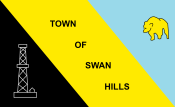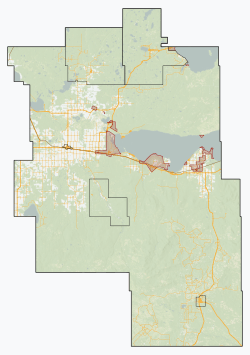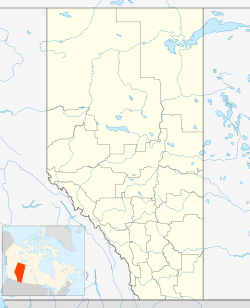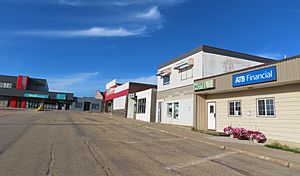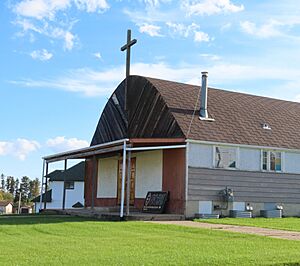Swan Hills facts for kids
Quick facts for kids
Swan Hills
|
|||
|---|---|---|---|
|
Town
|
|||
| Town of Swan Hills | |||
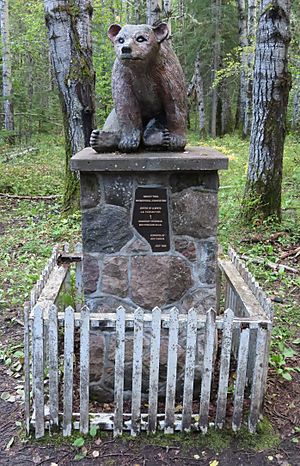
Centre of Alberta Natural Area
|
|||
|
|||
| Country | Canada | ||
| Province | Alberta | ||
| Planning region | Upper Athabasca | ||
| Municipal district | Big Lakes County | ||
| Incorporated | |||
| • New town | September 1, 1959 | ||
| • Town | January 1, 1967 | ||
| Area
(2021)
|
|||
| • Land | 25.87 km2 (9.99 sq mi) | ||
| Elevation | 1,113 m (3,652 ft) | ||
| Population
(2021)
|
|||
| • Total | 1,201 | ||
| • Density | 46.4/km2 (120/sq mi) | ||
| Time zone | UTC−07:00 (MST) | ||
| • Summer (DST) | UTC−06:00 (MDT) | ||
| Postal code span |
T0G 2C0
|
||
| Area code(s) | 780, 587, 825 | ||
| Highways | Highway 32 Highway 33 |
||
| Waterways | Morse River Freeman River |
||
| Website | townofswanhills.com | ||
Swan Hills is a small town located in northern Alberta, Canada. It's nestled within the beautiful Swan Hills area. The town is about 80 kilometers (50 miles) north of Whitecourt. It is also about 62 kilometers (38 miles) northwest of Fort Assiniboine.
The town sits where Highway 32 and Highway 33 (also known as Grizzly Trail) meet. It is surrounded by Big Lakes County. Did you know Swan Hills is the closest big town to the very center of Alberta? In 1989, a local person named Roy Chimiuk marked this spot. He placed a special stone monument, called a cairn, about 30 kilometers (19 miles) south of the town. This area is now protected as the Centre of Alberta Natural Area. You can hike about 3 kilometers (1.9 miles) from Highway 33 to see it.
Contents
History of Swan Hills
Swan Hills started as a simple camp for workers. These workers were busy in the oilfields nearby. Between 1959 and 1961, the government of Alberta and oil companies worked together. They moved the camp's buildings and services to where the town is now. People sometimes called it 'Oil Hills' because of the oil industry. But its official name, Swan Hills, comes from the thick forests in the area.
Becoming a New Town
On September 1, 1959, Swan Hills officially became a New Town. This was a big step! R.L. Maxfield was chosen to help develop the town. In November 1959, the first land was sold for businesses.
A proper road was finished in 1960. This new road made it much easier to get to Swan Hills from Fort Assiniboine. Before this, the old forestry road was very dangerous. The Swan Hills Post Office also opened in 1960. In June 1962, the Premier of Alberta, Ernest Manning, officially opened the New Town of Swan Hills.
Growing the Community
At first, two teachers taught 40 students in a small two-room school. But the town grew very fast! More oil workers moved their families there. Soon, a bigger school with seven rooms was needed.
For communication, the town used mobile radio units. Power came from a small diesel plant. But in 1960, things improved. Alberta Government Telephones started service. Canadian Utilities Ltd. built a long power line, about 138 kilometers (86 miles) long. By November 1965, Swan Hills became the most northern town in Alberta to get natural gas.
Becoming an Official Town
Swan Hills changed its status again on January 1, 1967. It officially became a full town. This was special because it was the first town to be incorporated in Canada's 100th birthday year! Tom Parkinson was elected as the first mayor. He served in that role until 1971.
Facing Wildfires
Swan Hills is located in a dense boreal forest. Because of this, wildfires have threatened the town many times. Residents have had to leave their homes at least six times. These evacuations happened in 1972, 1981, 1983, twice in 1998, and most recently in May 2023. The 2023 fire was called the Grizzly Complex wildfire. To help protect the town, Swan Hills now has a FireSmart program. This program helps reduce things that can burn easily inside and around the town.
Population of Swan Hills
The number of people living in Swan Hills has changed over the years.
In the 2021 Census, 1,201 people lived in Swan Hills. They lived in 512 homes. This was a small decrease from 1,301 people in 2016. The town covers about 25.87 square kilometers (9.99 square miles) of land. This means there were about 46.4 people per square kilometer in 2021.
Economy
The main industry in Swan Hills is oil and gas. Many people work in this field. The Swan Hills Treatment Centre, located north of the town, is also a big employer. This center handles waste. The town also serves as a hub for the logging industry.
Fun Things to Do
Swan Hills is surrounded by beautiful wilderness. This makes it a great place for people who love nature and outdoor sports all year round! You can enjoy activities like camping, hunting, fishing, and riding ATVs.
Annual Events
- Snowmobiling: Swan Hills is one of three points on The Golden Triangle. This is a huge 350-kilometer (217-mile) snowmobile trail! Many people visit for the yearly Swan Hills Snow Goers snowmobile rally.
- Motocross: The Swan Hills Dirt riders hold an annual motocross event. This is where people race motorcycles on a special dirt track.
- Target Shooting: The Swan Hills Outdoor Recreation Club hosts a yearly skeet-shooting competition. This takes place at the local gun range.
- Golfing: The Swan Hills Golf and Country Club has a 9-hole golf course. It's about 6 kilometers (3.7 miles) south of town. It's usually open from mid-April to mid-October, depending on the snow. They also host several golf tournaments each year.
- Curling: In the winter, the Swan Hills Curling Club hosts several annual bonspiels. A bonspiel is a curling tournament.
- Hockey: Also in winter, Swan Hills Minor Hockey hosts several exciting tournaments.
Education
Students from Kindergarten to Grade 12 attend Swan Hills School [1]. This school is part of the Pembina Hills Public Schools district.
Famous People from Swan Hills
- Evan Williams, an actor and musician
- Leland Irving, a professional hockey player
Places to Visit Nearby
- Goose Mountain Ecological Reserve
- E.S. Huestis Demonstration Forest
- Trapper Lea's Cabin
- Centre of Alberta Natural Area
- Swan Hills Airport
 | Jewel Prestage |
 | Ella Baker |
 | Fannie Lou Hamer |


